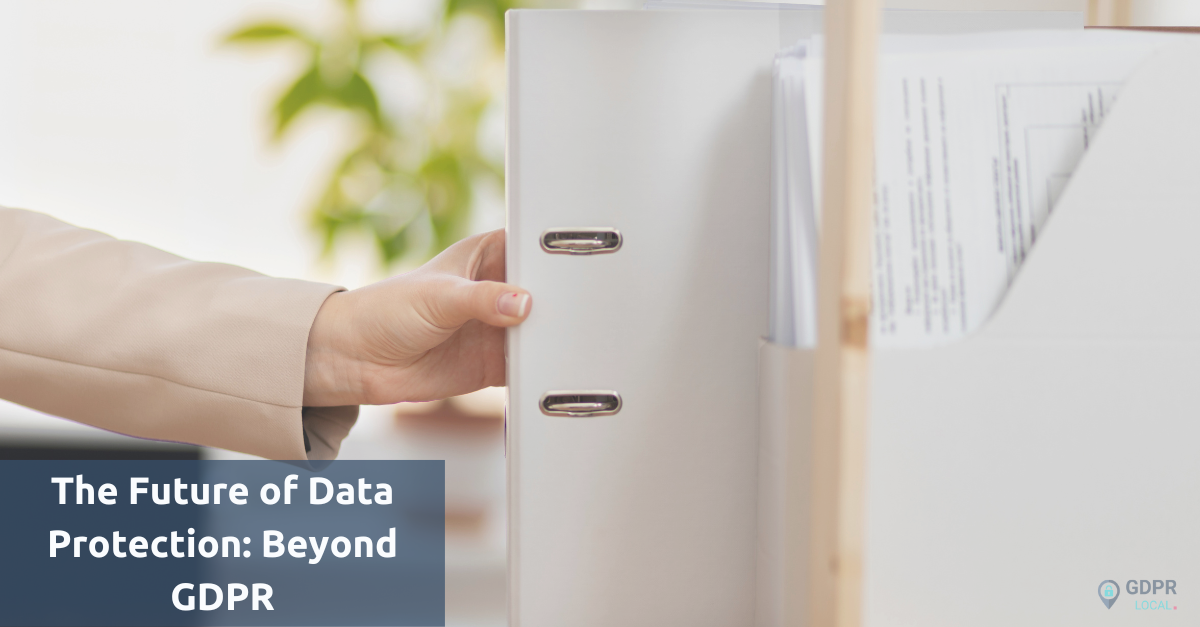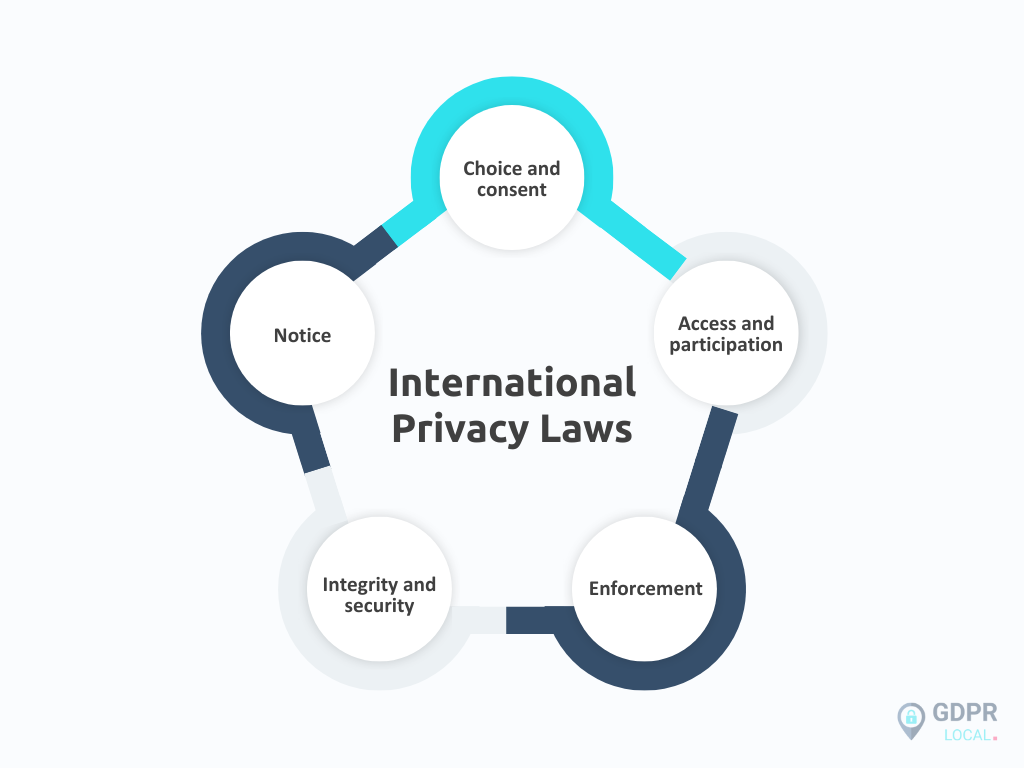
The Future of Data Protection: Beyond GDPR
Personal information is increasingly stored and shared online, making it essential to have secure measures in place to protect this data from unauthorized access, breaches, and misuse. The implementation of the GDPR in 2018 was a significant step towards strengthening data privacy and security. However, the landscape of data protection continues to evolve, and new challenges and trends are shaping the future of this field.
In this article, we explore data protection beyond GDPR, addressing global privacy laws, their benefits, and implementation. Learn about the impact of Schrems II, emphasizing data sovereignty, and examining the role of technology like AI and encryption in enhancing privacy and data security.
The Evolution of International Privacy Laws
As data privacy concerns continue to grow, countries around the world are enacting their own privacy laws to protect their citizens’ personal information. These international privacy laws are guided by five global privacy principles:

1. Notice: Informing users about the policies and measures in place to protect their personal information.
2. Choice and consent: Giving individuals control over the collection, use, and storage of their data.
3. Access and participation: Ensuring that data is accessed and used by authorized individuals within secure protocols.
4. Integrity and security: Implementing measures to protect data from unauthorized access and maintaining its integrity.
5. Enforcement: Enforcing compliance with regulations and holding organizations accountable for data protection.
The GDPR emphasized the need for data protection, focusing on mitigating risks, fraud, and compromise while protecting individuals’ rights.
International Data Protection
Apart from Europe, several countries have enacted their own privacy laws to ensure data protection. Let’s explore some of the notable regions and countries with international privacy laws:
Europe
The GDPR was a groundbreaking regulation that impacted organizations processing personal data from EU citizens. It introduced stringent controls and hefty fines for non-compliance. The enforcement of GDPR has led to increased data protection regulations and reputational damage for organizations that ignored compliance. It has become essential for organizations to be compliant and seek the right support to achieve it.
The United States
At the federal level, the United States does not have comprehensive privacy laws. However, some federal legislation exists to protect data on a general level. Due to the devolution of power to the state level, several U.S. states have enacted their own data-related laws. California’s CCPA is considered one of the most forward-thinking privacy laws, providing robust privacy rights and consumer protection. Other states, such as Alabama, Connecticut, Florida, and New York, have also introduced or are in the process of passing their own privacy laws.
Brazil
Brazil has implemented the General Data Protection Law (LGPD), which supplements over 40 existing data privacy-related laws in the country. This legislation aims to harmonize conflicting laws, define concepts of personal and public data, outline liabilities, and apply to all sectors. The LGPD requires companies to adopt data protection officers and implement rigorous security protocols for comprehensive compliance. While administrative sanctions were initially set to be enforced from August 2021, the ANPD will oversee the enforcement of LGPD.
South Africa
South Africa has implemented the Protection of Personal Information Act (POPIA) to establish stringent personal data protection controls. The act has undergone iterations since its inception in 2013 and will fully come into effect in July 2021. The privacy laws and protections outlined in POPIA are on par with the GDPR’s standards.
Bahrain
Bahrain introduced the Data Protection Law, the first of its kind in the Middle East, providing individuals with rights regarding the collection, processing, and storage of their data.
The Philippines
The Philippines enacted the Data Privacy Act of 2012, which aligns with the EU Data Protection Directive. It ensures the protection of personal information by organizations.
Canada
Canada implemented the Personal Information Protection and Electronic Documents Act (PIPEDA), which aligns with EU data protection law. The Digital Charter Implementation Act (DCIA) is currently under review and could introduce significant changes to privacy legislation in the country.
United Kingdom
The GDPR applied in the United Kingdom until July 2021. From January 2021, the Data Protection Act 2018 implemented GDPR’s requirements into UK law. The Data Protection, Privacy, and Electronic Communications (DPPEC) Regulations of 2019 amended the DPA 2018 to create a UK-specific data protection system known as the UK GDPR.
India
India has enacted the Personal Data Protection Bill, which embeds many principles of the GDPR within the country’s context. However, there have been legal challenges regarding the use of Aadhaar data, which is a unique 12-digit identification number for Indian residents.
Other Countries
Other countries, such as Australia, Angola, British Virgin Islands, Denmark, Finland, Nigeria, and Israel, have also implemented their own international privacy laws to protect personal data.
It is crucial for organizations to understand the privacy laws and regulations in the regions they operate in or with which they interact. Compliance with these laws ensures data protection and helps build trust with customers, investors, and partners. Organizations that prioritize data protection gain a competitive advantage, improve brand value, and enhance innovation and transformation processes.
The Impact of the Schrems II Ruling
The Schrems II ruling had a significant impact on global international privacy regulations. It addressed the transfer of information from the EU to the United States and reshaped how organizations operating across multiple countries and legislations approach data protection.
The ruling underscores the need to ensure that data transferred outside the EU is adequately protected, equivalent to GDPR standards. Organizations need to assess the legal frameworks and safeguards in place in the recipient country to ensure compliance. This ruling has led to increased scrutiny of data transfers and the implementation of additional measures to protect personal information.
The Schrems II ruling emphasizes the need for organizations to assess their data transfer practices and implement appropriate safeguards, such as standard contractual clauses or binding corporate rules, to ensure the protection of personal data.
The Importance of Data Sovereignty
With the global nature of data transfers and cloud services, the concept of data sovereignty has become crucial. Data sovereignty refers to the idea that data should remain subject to the laws and regulations of the geographic location where it was collected and processed.
Data sovereignty ensures that data remains under the control of its owner and is subject to the jurisdiction’s regulations where it originated. This is particularly relevant for organizations that operate in multiple countries or leverage cloud services provided by foreign entities.
By implementing solutions that enable end-to-end encryption and allow organizations to manage their encryption keys, data sovereignty can be maintained. Encryption ensures that even if data is stored or transmitted through third-party services, it remains protected and inaccessible to unauthorized parties.
Organizations should prioritize data sovereignty to maintain control over their sensitive information and comply with relevant regulations. By leveraging encryption and secure data management practices, organizations can reduce the risk of data breaches and ensure compliance with international privacy laws.
The Role of Technology in Data Protection
As the field of data protection evolves, technology plays a crucial role in mitigating privacy risks and ensuring data security. Here are some technological advancements shaping the future of data protection:
Artificial Intelligence (AI)
AI has the potential to revolutionize data protection practices. AI-powered solutions can analyze large volumes of data, identify patterns, and detect anomalies that may indicate potential data breaches or privacy risks. By leveraging AI, organizations can proactively identify and respond to threats, enhancing their overall data protection strategies.
Encryption
Encryption is a fundamental technology in data protection. It ensures that data is transformed into an unreadable format, making it inaccessible to unauthorized parties. Implementing end-to-end encryption, like Virtru’s platform, safeguards sensitive data at rest and in transit for comprehensive protection.
Data Loss Prevention (DLP)
DLP solutions help organizations prevent the unauthorized disclosure of sensitive data. These solutions analyze data usage patterns and apply policies to prevent data leakage through various channels, such as email, cloud storage, or USB devices. DLP solutions play a crucial role in data protection by identifying and preventing potential data breaches.
Secure Collaboration Platforms
Secure collaboration platforms, such as Virtru for Google Workspace and Virtru for Microsoft 365, enable organizations to share sensitive information securely. These platforms provide end-to-end encryption, access controls, and auditing capabilities, ensuring that data is protected even when shared with external partners or stakeholders.
Conclusion
The future of data protection goes beyond GDPR, encompassing global privacy laws, Schrems II rulings, data sovereignty, and technology’s crucial role in securing data. Organizations must stay informed, adapt strategies for compliance, and maintain customer trust in an evolving landscape.
By prioritizing data protection, organizations can mitigate privacy risks, prevent data breaches, and enhance their overall security posture. Implementing technologies such as AI, encryption, and secure collaboration platforms empowers organizations to proactively address data privacy challenges and protect sensitive information.
As the field of data protection continues to evolve, it is essential for organizations to stay updated on the latest regulations, best practices, and technological advancements.
Remember, data protection is not just a legal obligation; it is a crucial aspect of building trust, maintaining reputation, and fostering customer loyalty.